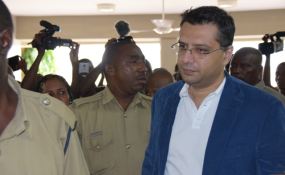Dar es Salaam — The value of exports of manufactured goods dropped by $272.4 million (Sh607.5 billion) last year amid a credit crunch, new data shows.
If the trend continues it is likely to hit the endeavour to turn Tanzania into an industrialised middle-income economy as envisioned in the second Five-Year Development Plan whose implementation runs from 2016/17 to 2020/21.
A total of Sh107 trillion – to be sourced from both the public and private sectors – is required to finance the plan.
However, the government believes that what happened last year was nothing unusual.
“Data on exports is always changing according to prevailing circumstances. Sometimes exports increase, sometimes they fall…nothing unusual in this,” Industry, Trade and Investment minister Charles Mwijage told The Citizen yesterday, adding that the government’s industrialisation agenda was still on track.
The value of exports of manufactured goods crossed the $1 billion mark in 2012 to hit $1.037 billion, up from $861 million in 2011.
It further climbed to $1.23 billion and $1.36 billion in 2014 and 2015, respectively, before dropping to $1.09 billion in 2016, according to the Bank of Tanzania (BoT).
BoT says in its January 2017 Monthly Economic Review that there was a marked fall in exports of commodities such as edible oil, plastic goods and ceramic and glassware.
Manufacturers have been taken by surprise and have asked to be given enough time to analyse the trend.
“What we have is a generalised figure. We need to conduct an analysis from the sector’s perspective,” the First Vice Chairman of the Confederation of Tanzania Industries, Mr Jayesh Shah, told The Citizen.
Going by the BoT figures, however, it is clear that the manufacturing sector, like other key areas, has suffered due to a sharp drop in credit as banks adopted a more cautious approach to lending in response to tight liquidity.
The illiquidity was partly attributed to the government’s decision to transfer public institutions’ deposits from commercial banks to BoT and non-performing loans (NPLs).
Total credit to the private sector declined by 7.2 per cent in the year ending December 2016.
NPLs accounted for an average of 9.5 per cent of all loans issued against a target of below five per cent.
The manufacturing sector last year registered a -4 per cent (minus four per cent) growth rate in credit as the entire private sector registered a drop in credit throughout the year.
Interestingly, BoT data, however, shows that there was an 18.5 per cent increase in imports of industrial raw materials in 2016.
The number of new projects may have declined last year as evidenced by a 52 per cent ($618.3 million) drop in the value of capital machinery imports, associated largely with the completion of some major projects, including construction of a cement factory in Mtwara, gas power plants, and exploration activities.
Mr Mwijage told The Citizen yesterday that he was ready visit all major factories in the country and get a first-hand account of challenges faced by manufacturers as part of efforts to boost exports of manufactured goods.










